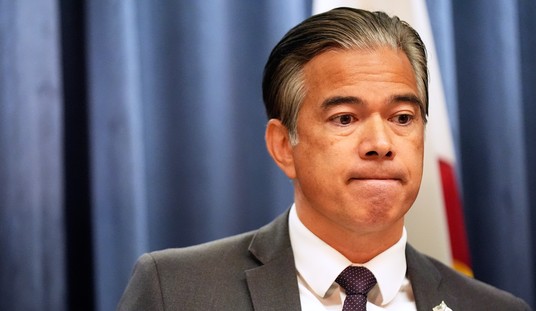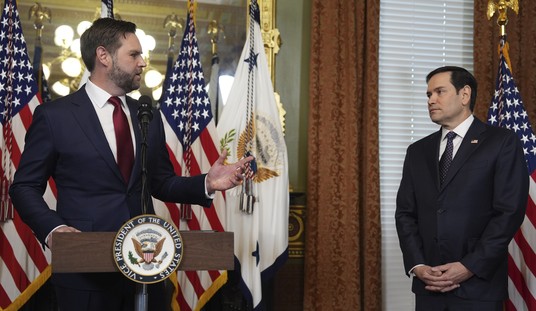During the Democratic debacle of the midterms, speculation abounded about whether Barack Obama would face a challenger in 2012, especially from the anti-war Left. The post-election bump seemed to put an end to the notion, but with Obama’s numbers reverting to 2010 form and a fumbled start to a fresh military adventure, will it arise again? Steve Chapman remembers how Obama became president:
Democratic voters in 2008 had their pick of many candidates for president — from Hillary Clinton to John Edwards to Joe Biden. Why did they choose Barack Obama?
After all, he had less experience in office than many of his rivals. He was not as well-known. He had the potential electoral liability of being black. No one knew if he was tough enough to stand up to Republican assaults in a nasty campaign.
So what accounts for his success? More than any other reason, he won because he had opposed the invasion of Iraq — which Clinton and others had endorsed. Obama was the peace candidate of 2008. As the long and costly war dragged on, that was a priceless asset. …
But the mood of Democrats may be changing. The liberal magazine the Nation decried the intervention in Libya as “flagrant hypocrisy.” John Larson, chairman of the House Democratic Caucus, upbraided Obama for not consulting Congress.
Rep. Dennis Kucinich, D-Ohio, called the war “another disaster.” If our involvement lasts weeks or months instead of days, Obama could lose many Democratic members.
Hillary carried the burden of her husband’s interventionism, but neither Edwards nor Biden was a more serious candidate than Obama. All Edwards could claim was that he had actually completed one term in the Senate, while no one could remember when Biden hadn’t been there — plus Biden had an embarrassing plagiarism scandal on his record as well. The only serious candidate on the trail was Bill Richardson, who actually had executive, legislative, and diplomatic experience, unlike every single one of his competitors for the nomination in 2008, and Richardson also tried running on the anti-war platform with little success.
I’m not certain that Obama won on that basis, or just on the general feeling that no one really wanted a Clinton to replace a Bush again, and Edwards seemed too slick and fake as an ambulance chaser-cum-populist. Obama benefited more from being at the right place at the right time, and then seizing Edwards’ angry-populist mantle and adding a dash of Hope and Change to make it more palatable. Other than that slogan, Obama offered no particular example of anti-war activism — and campaigned on a more vigorous prosecution of the war in Afghanistan than even John McCain, one promise he’s actually kept.
But that doesn’t lessen the danger for Obama from a defection of the anti-war base. That constituency fought enthusiastically for his election in 2008, providing energy and foot soldiers for his GOTV efforts. If they leave, and Obama loses the center as Democrats did in 2010, he won’t win a second term, and his party will face another debacle in the Senate. If that perception spreads, the weakness will encourage challengers to Obama in the primaries.
Will they be significant challengers, though? Dennis Kucinich will probably roll out the Grandfather Time endorsement again, and Ralph Nader will run a Moldy Green campaign if no one else bothers, but neither will have any impact on Obama’s renomination. Chapman recalls 1968, when Senator Eugene McCarthy from Minnesota ran on an anti-war platform and shocked the nation by almost beating Lyndon Johnson in New Hampshire, forcing him to withdraw from his re-election campaign. McCarthy was seen as a serious candidate, although he didn’t win the nomination; Bobby Kennedy would have won it had he not been assassinated, and instead the Happy Warrior, Minnesota’s Hubert H. Humphrey, went on to lose against Richard Nixon.
It’s difficult to see a McCarthy among today’s Democrats. Russ Feingold might be significant enough to matter, but he just lost his last statewide election, and Obama campaigned on his behalf. Chapman suggests James Webb, but Webb isn’t even interested in running for a second term in the Senate, and isn’t exactly the most anti-war Democrat. Richardson might be a better choice; the federal investigation into questionable dealings during his term as governor has ended without any charges, and he owes nothing to Obama or to Hillary, whose diplomacy he would have to sharply criticize in a primary fight. Richardson could run on both an anti-war platform and on the issue of executive incompetence. Otherwise, even though the opening may be there, anti-war Democrats may not have anyone to fill it.
Update: LBJ did win New Hampshire, but just barely, over McCarthy. I’ve corrected the reference.







Join the conversation as a VIP Member